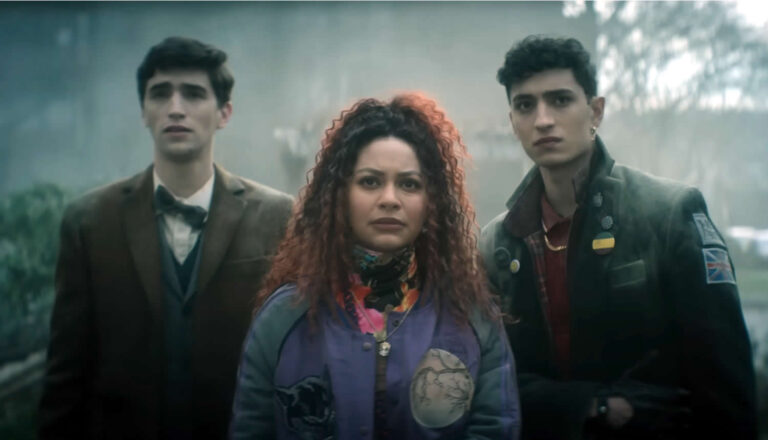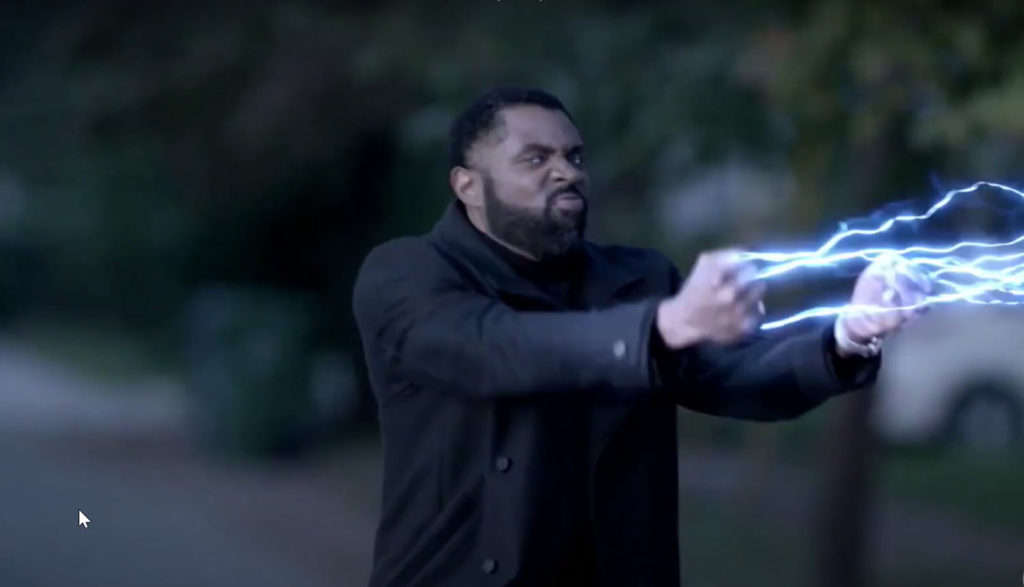
Dead Boy Detectives
Dead Boy Detectives targets teens in style and story. But it comes with very adult, problematic content.

The things parents have to deal with these days. One could say it’s, um, shocking.
Take Jefferson Pierce, former Olympic athlete, current high school principle and father of two. For years he’s been a pillar of the community in Freedland: His school has been a beacon of hope for the largely minority teens who attend. People look up to him, and well they should.
But man, it hasn’t been easy. And as difficult as it is to deal with Freedland’s many threats, his kids are the ones who put him through the ringer.
Anissa and Jennifer are now superheroes in their own right, having inherited some impressive skills from their dear old pops. But they’ve got some ideas of their own. Oldest daughter, Anissa—known as Thunder to the bad guys—put the word “active” in social activist long before she discovered her powers. And she thinks her father’s sometimes not so much a pillar as he is a pushover. Youngest daughter Jennifer, meanwhile, has become Lightning, and she might just be the strongest meta (the show’s word for superpowered folk) in the fam. But sometimes, she doesn’t just use her powers for good: She uses them for fun—and that can be a problem in its own right.
Oh, and Jefferson’s wife, Lynn, has gotten some superpowers of her own … through science.
As we head into Season 4, all of them are doing more superheroing than Jefferson. Still reeling from the events of the last few seasons and having lost his closest friend, Jefferson’s done with the suit—or so he says.
“Black Lightning was trying to save the world,” he confesses. “I’m just trying to save my family.”
But new threats to both lurk everywhere in Freeland. Archenemy Tobias is back after a nice hiatus—positioning himself as a city philanthropist in order to get closer to Jefferson and his family. The 100, a notorious street gang, is ready for action, too. A new police chief is determined to identify, watch and control every meta in the city.
And then there’s Jefferson himself. His losses have twisted his character. He’s drinking heavily. He quietly sulks. Once willing to turn the other cheek, he’s liable to light up anyone whom he deems deserves it.
Freeland needs Black Lightning more than ever. And maybe Jefferson needs him too.
Black Lightning is the latest D.C. superhero to find a home on The CW, and what a home it’s been. The network has been home to a veritable neighborhood of superheroes, from Arrow to the Flash to Supergirl, and more are on their way.
All of those superhero shows have their problems, of course. But CW has done a fine job of developing its stable of superheroes—staying true to the characters and building a loyal fanbase around each property.
It does so again with Black Lightning, too. But that praise comes with a caveat.
Supergirl, Arrow and The Flash all take their cues from D.C. characters born in what’s known as the Golden and Silver Age of comic book superheroes—all before 1970. While comic books certainly had their critics back then—some considered them the Grand Theft Auto of the day—the superheroes were, by today’s standards, pretty optimistic and innocent. The CW characterizations of them retain a whiff of that innocence: Barry Allen of The Flash is as well-meaning as they come, and Supergirl’s Kara Danvers is a golly-gee throwback. (Some of the ancillary characters have contemporary issues, but that’s literally another review).
Black Lightning, in contrast, was conceived in 1977, during D.C. Comics’ Bronze Age. Superheroes were no longer content to just kapow their way through hordes of bad’uns: They were dealing with issues, man. Personal issues. Societal issues. Caped crimefighters were grounded in a deeper sense of reality (relatively speaking) and peril.
CW takes its superheroes seriously, and Black Lightning is a more serious superhero.
That’s not all bad: Black Lightning grapples with volatile issues like gangs and racial profiling and does so with, in my opinion, some nuance and understanding. It gives us a complicated hero who (generally) wants to do the right thing, even if he’s not always sure what the right thing is. “I’ve saved more lives as a principal than I ever would have as Black Lightning,” he says.
But Black Lightning is CW’s edgiest superhero show. We hear lots of talk about gangs and drugs. Blood is not an infrequent visitor to the screen, and some scenes can be truly wince-inducing. Language is often raw. And while it’s early in the show’s run and we’ve yet to see anyone hop into bed with someone, we’ve already heard plenty of references to sex, and even a veiled threat at selling someone into prostitution. Anissa, a lesbian in comics, brings that same-sex attraction to the small screen, too. (Her fiancée, Grace, is currently in a coma after the events of Season 3.)
Black Lightning is ultimately a mixed bag. Sure, it has some charged characters and occasionally electric storytelling. But the content can be stormy indeed.
Jefferson and his family are still reeling from the events of Season 3 (when Freeland ultimately repulsed an invasion by the country of Markovia), and Jefferson is determined to set aside his Black Lightning persona for good. But he also seems a little out of control: When he sees two policemen harass a black teen, he turns his superpowers against the cops—not knowing that some street security cameras capture his license plate. When a gang member of The 100 hurts his daughter, Jennifer, Jefferson tracks the gangster down and nearly kills him. Meanwhile, Jennifer and Anissa—aka Lightning and Thunder—disrupt The 100’s drug trafficking, and Lynn (using some superpowers she borrowed via her scientific efforts) stops a couple of would-be human traffickers from taking another victim.
Jefferson’s attacks feel pretty jarring, given his traditional mode of operation. Admittedly, the police are pretty violent with the young black man they harass, throwing him against the squad car and roughing him up. Jefferson later tells someone that they would’ve killed the teen had he not been there. But when the police tell Jefferson to get back in the car—pointing their guns at him as they do—Jefferson knocks them both out with lightning, then wipes their memories (and their bodycams) with his electrical powers, too. And, for good measure, he zaps the squad car as well, disabling its own camera. (He later lies to the police chief when she asks him whether he was involved.) When he attacks the gang member, he punches the criminal repeatedly in the face, drags him through a hallway, holds him against the wall by his neck and pours electrical current into his face.
Thunder and Lightning battle several bad guys (knocking most of them out), but one of the sisters gets shot by a special anti-meta weapon, seriously injuring her. (She recovers quickly.) Lynn fights with a couple of villains, too, rendering one of them unconscious. A crime lord threatens to kill four associates unless they clean up a particular mess. Someone falls from a dizzying height. (The show ends before we see the end of the fall.) We hear some discussion of “corporate assassins.” Anissa tells Jefferson that she and Jennifer and Lynn have all killed people—arguing that they need to kill Tobias, too. “We’ve already taken lives, Dad,” she says. “It doesn’t make us murderers.” (Jefferson disagrees.)
Jefferson and Lynn go to marriage counseling and talk about their lack of a sex life, with Jeff saying that whenever he makes a move, Lynn shuts him down. The counselor says trust has to come before any sort of emotional intimacy. “The honestly about what you’re feeling, it has to be there,” she says. “It has to be there first.”
Jennifer can fly, and it seems like the ability might make her not just high physically, but perhaps in the more intoxicating sense, as well. Jefferson drinks a lot in this episode, and a friend at a bar cautions him about overdoing it. “What’s at the bottom of that glass isn’t going to make you feel any better,” he says. Someone else drinks wine. Tobias comes back to town under the tag “Make Freeland Great Again,” a not-so-subtle jab at Donald Trump. Characters say “a–,” “b–ch,” “d–n” and “h—,” And we hear a couple of misuses of God’s name.
Jefferson pursues Joey Toledo, a drug cartel leader, hoping that he’ll lead him to Tobias, whom the hero hopes to kill and thus stop the trafficking of the drug Green Light. But Jefferson also is facing some mysterious health issues, making him both aggressive and reckless.
Green Light, has side effects which include super strength and hyper-aggression. A young man, high on the stuff, pushes and hits cops, and when they try to shoot him, Black Lightning stops them. There are other scenes that include punching, hitting and kicking.
Jennifer arrives at a party and is confronted by two girls who, after some insults are exchanged, try and beat her up. In self-defense, Jennifer breaks a girl’s wrist and hits the other. The girl’s mother and aunt confront Jennifer’s parents, but while Jefferson is secretly happy she defended herself, he tells her “the best choice is to walk away.”
Anissa uncovers her grandfather’s old documents, and what she finds there makes her realize she could die in investigating his mysterious death. She goes to a lingerie store, helped by a man who assumes her choices are for a boyfriend: She corrects him, telling him that they’re for a woman.
Tobias says he’s tired of “managing Negros” and senses he’s losing status. He decides that by breaking his abusive father’s back and letting him die slowly, he’ll heal emotionally and regain power. Lady Eve, the head honcho in the criminal network Tobias belongs to, tells him in a flashback that albinos like Tobias were killed and ground to “magic dust.” He receives this dust as a warning.
We hear the word “a–” used nine times and in various ways. “H—” is used six times, “d—” is used four times, and “d–mit” once. Someone is called a “little b–ch.” Jennifer asks Anissa if she’s watching porn or into bondage with whips and chains (she’s not). Women wear tight dresses revealing cleavage, and other tight costumes are worn (one revealing a rip near Anissa’s butt). Black Lightning is seen shirtless.
Jennifer, Jefferson’s late-teens daughter, sneaks out of a school fundraiser and lands in a notorious nightclub. But when she’s pulled into the orbit of a member of the notorious gang The 100, Jefferson’s forced to rescue her—escalating tensions and forcing Jefferson back into his long sidelined role as Black Lightning.
We hear and see plenty of allusions to police racial profiling: Jefferson’s pulled over by the police—the third time in a month, he says—and dragged out in the rain. He’s angry, but he deals with the rough use. “Returning violence for violence multiplies violence,” he quotes Martin Luther King Jr. But when he rescues his daughter and police stop him instead of any of the malcontents fleeing the scene, his temper gets the better of him: He shocks the police with lightning, rendering them unconscious.
He shocks plenty of others, too, and it doesn’t look pleasant. He holds one man up with his electrical bolts, dangling him over a balcony before hurling him into his own parked car. (We don’t know whether the man is unconscious or possibly dead.) But Black Lightning isn’t immune to violence: He’s shot in the torso once, and while his suit prevents serious injury, he does nurse a wound later. He suffers cuts elsewhere: When he showers, audiences see blood running into the drain, and in flashback we see him treating bloody, terrible-looking injuries. Another man is shot in the chest with a small harpoon, then dragged over to someone’s desk by the tether. A man screams and is apparently thrown into a fish tank, where he seemingly drowns. A boy is thwacked in the head. Someone’s kneed in the groin. People are punched and kicked.
Jennifer’s experience at the nightclub is one big problematic element. When a boy sidles over to her, she tells him, “Don’t think just because I’m a little stoned, that means you’re gonna get some. Because I’m not having sex in a club bathroom with somebody I just met.” We see her and others drink and smoke. The 100 is heavily involved in the drug trade, we learn, and we see a baggie of drugs drop on a school floor. Gang members threaten to send Jennifer to a dive of a motel to “work off” her supposed boyfriend’s debt; later both she and her sister are kidnapped and held at that same hotel, where again it’s suggested that they’re about to be forced into prostitution. There’s a reference to “whoring.” We see women dressing and displaying cleavage and midriffs.
Someone snidely suggests that Jefferson is like “Black Jesus” in the city of Freedland. He’s complimented on his tux, and is told, “You should start a church. … At least you’d make more money.” Passing references are made to Christianity and other religions. A bad guy says that the concept of resurrection is “beautiful, but it’s a complete fantasy.” Characters say “a–“, “b–ch,” “p–s,” “d–n” and “h—” multiple times.


Paul Asay has been part of the Plugged In staff since 2007, watching and reviewing roughly 15 quintillion movies and television shows. He’s written for a number of other publications, too, including Time, The Washington Post and Christianity Today. The author of several books, Paul loves to find spirituality in unexpected places, including popular entertainment, and he loves all things superhero. His vices include James Bond films, Mountain Dew and terrible B-grade movies. He’s married, has two children and a neurotic dog, runs marathons on occasion and hopes to someday own his own tuxedo. Feel free to follow him on Twitter @AsayPaul.

Kristin Smith joined the Plugged In team in 2017. Formerly a Spanish and English teacher, Kristin loves reading literature and eating authentic Mexican tacos. She and her husband, Eddy, love raising their children Judah and Selah. Kristin also has a deep affection for coffee, music, her dog (Cali) and cat (Aslan).

Dead Boy Detectives targets teens in style and story. But it comes with very adult, problematic content.

An elf mage contemplates on connection and regret as she watches her human friends grow old and pass away.